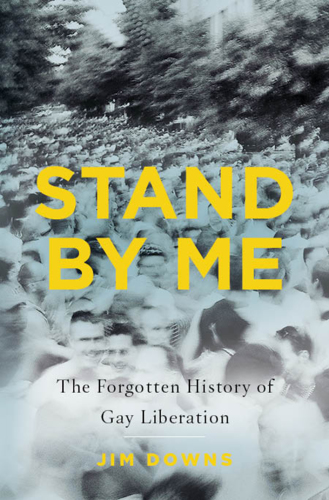
Stand by Me
The Forgotten History of Gay Liberation
کتاب های مرتبط
- اطلاعات
- نقد و بررسی
- دیدگاه کاربران
نقد و بررسی

January 1, 2016
Downs (History/Connecticut Coll.; Sick from Freedom: African-American Illness and Suffering during the Civil War and Reconstruction, 2012, etc.) aims to dispel the misconception that gay liberation in the 1970s was primarily focused on sexual freedom. In this slim though well-documented history, the author provides vivid accounts of noteworthy movements and issues that surfaced during this decade, each playing a vital role in advancing meaningful change within the gay community. He examines how the rise of gay churches and gay bookstores helped to foster a sense of community; how the establishment and expanding influence of gay newspapers (with particular attention devoted to the Toronto-based publication The Body Politic) heightened awareness; and how certain reforms alleviated the abuse and sexual mistreatment of gay prisoners. The author also explores how the emergence of the "macho clone" redefined gay male culture and identity, in many ways disrupting the progress. "The popularity of this image erased women and people of color from the gay community," writes the author. While Downs successfully asserts a grounded claim that gay life in the 1970s was by no means only about sex, it can be argued that for many it was also about sex, in profoundly more complex and defining ways than he allows here. "There is little question that sex shaped, informed, and mattered to gay people throughout this decade, but it was not defining, as the received narrative has it," he writes. In his earnest endeavor to sustain his argument, the author gives negligible attention to this facet of the history, leaving his overall conclusion unbalanced. The book would have also benefited from a more expansive perspective, relating how these various efforts specifically helped to shape progress leading up to the present. By applying such a narrow lens to just the '70s, the broader impact of this decade within the history of the movement feels underserved. An intelligent and thought-provoking though somewhat limited addition to the historical record of the gay liberation movement.
COPYRIGHT(2016) Kirkus Reviews, ALL RIGHTS RESERVED.

Starred review from February 1, 2016
In popular imagination, the 1970s were a time of wanton hedonism and licentiousness among gay men. That narrative is only part of a picture that Downs (Sick from Freedom) wants to make complete by looking at the many ways in which the gay political movement progressed during the decade. What Downs demonstrates is how social institutions such as the Metropolitan Community Church and other religious organizations grew. It was also a foundational period for research into gay history and culture, the monument being the publication of Jonathan Ned Katz's Gay American History in 1976. Downs uses that work and the example of the Oscar Wilde Bookshop in New York to portray the intellectual growth of the community. He begins with the tragedy of the arsonist attack at the UpStairs Lounge in New Orleans in 1973, documenting the hatred of the time, and concludes by saying, "one of my goals in this book has been to shift the focus of the discussion of gay culture from sex to religion, and from intimacy to community." VERDICT Downs's highly recommended and necessary corrective to the mythology of gay life in the 1970s will appeal to both academic and general readers.--David Azzolina, Univ. of Pennsylvania Libs., Philadelphia
Copyright 2016 Library Journal, LLC Used with permission.

March 1, 2016
Beginning with the largest massacre of gay people in America at a 1973 New Orleans observation of the fourth anniversary of the Stonewall riots, historian Downs draws on LGBTQ materials long underrepresented in superficial media accounts of gay life. Past chronicles have defined the gay community by focusing on free love and HIV/AIDS. Downs upends this, detailing more inclusive and representative subjects, tracing the history of gay rights as part of the ongoing battle for civil rights, and covering the gay religious movement, which fought churches' discriminatory behaviors and led to the ordination of gays and lesbians, and the founding of the Metropolitan Community Churches, the first church group with an LGBT ministry. Downs looks to politics, too, tracing the career of such openly gay politicians as U.S. Representative Barney Frank, and other key historic transformations that liberate gay life from an overemphasis on sex. A valuable addition to LGBT and social-change collections.(Reprinted with permission of Booklist, copyright 2016, American Library Association.)

























دیدگاه کاربران